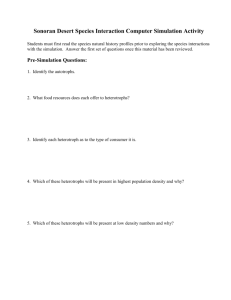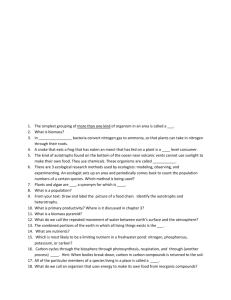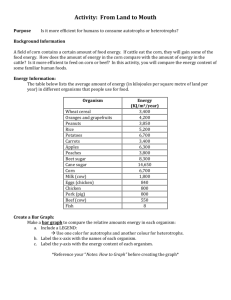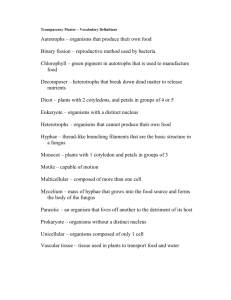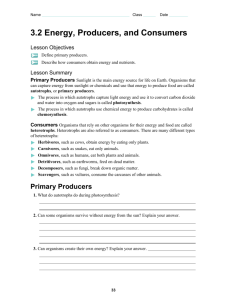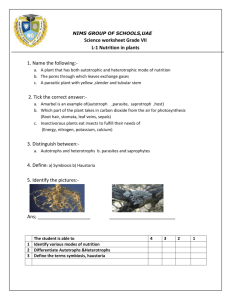Bellwork Thurs. 3-31-11
advertisement
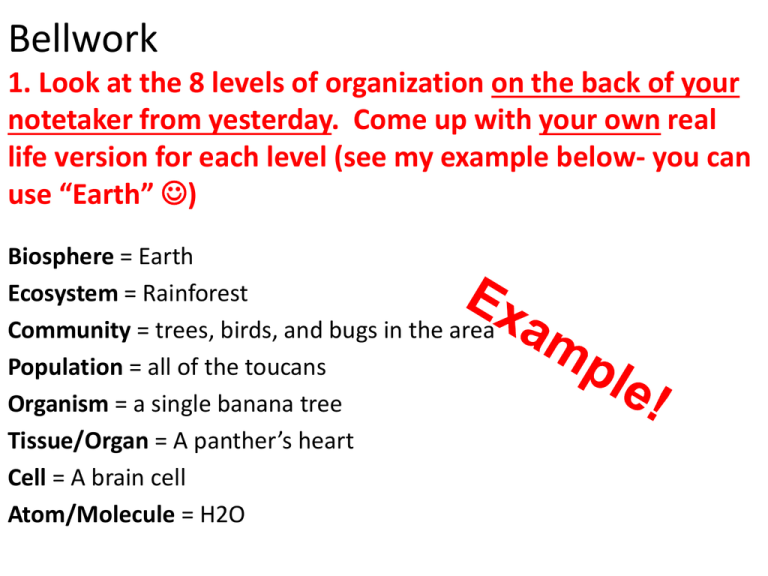
Bellwork 1. Look at the 8 levels of organization on the back of your notetaker from yesterday. Come up with your own real life version for each level (see my example below- you can use “Earth” ) Biosphere = Earth Ecosystem = Rainforest Community = trees, birds, and bugs in the area Population = all of the toucans Organism = a single banana tree Tissue/Organ = A panther’s heart Cell = A brain cell Atom/Molecule = H2O Energy Flow & Roles of Organisms (notes on lined paper) Autotrophs “Self” “food” Autotroph = organism that makes food for itself (producer) Talk to Your Partner Based on the definition we just wrote down, what are some examples of autotrophs? Autotrophs “Self” “food” Autotroph = organism that makes food for itself (producer) -Ex: plants & some bacteria Heterotrophs “Different” “food” Heterotroph = organism that eats other organisms (consumers) I must be a heterotroph, since I can’t synthesize these! Heterotrophs “Different” “food” Heterotroph = organism that eats other organisms (consumers) -Examples: animals, fungus, bacteria Try this! (5 mins) At your lab table: Work as a group to quickly sort the cards & use arrows to show which direction energy is flowing Example: 2 Big Categories of Organisms Make a T-chart Autotrophs/ Producers Heterotrophs/ Consumers There are two types of autotrophs/producers Autotrophs 1. Phototroph : use energy from sun to make food (photosynthesis) Autotrophs 2. Chemotrophs : use energy from chemicals to make food Ex- Bacteria in deep sea vents There are many types of heterotrophs List as many types as you can Hint: A cow is one type Heterotrophs 1. Herbivores : eat ONLY plants Heterotrophs 2. Omnivores : Eat BOTH plants & animals Heterotrophs 3. Carnivores : eat ONLY meat Heterotrophs 4. Scavengers: feed on dead organisms • Ex. – Vultures, Shrimp, Mealworms! Heterotrophs 5. Decomposers : Absorb dead materials/waste & break them down into fertilizers for plants • Ex. – bacteria, mushrooms Try this! (Part 2) Add organism terms to the cards at your lab table Example: Omnivore Closure 1. On back of notes- Draw a simple food chain for your critter, with at least 5 organisms. 2. Label each organism with vocab- herbivore, phototroph, etc. 3. When finished, put together your critter & drop it off in the front basket
